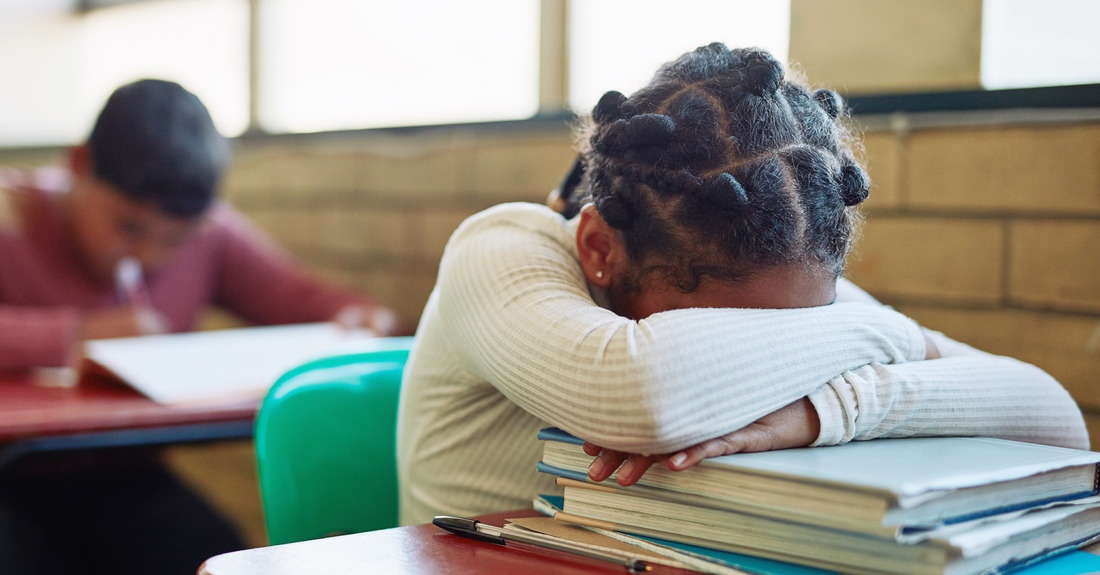
While children may not have the stressors of work, relationships, finances or parenting, there are still factors affecting a kid’s mental health. As 1 in 5 children in the U.S. experience a mental disorder (Centers for Disease Control and Prevention), it’s no surprise how this can affect their performance in the classroom.
Depression, anxiety, ADHD, substance use disorders and more not only lead to health risks, they also negatively impact student learning and achievement. The importance of mental health in early childhood is increasing awareness in schools and communities as people work to provide resources to help children, which is crucial as the American Psychiatric Association says about half of all mental illness begins by age 14. Keep reading to learn more about the importance of mental health in education.
How has mental health affected education?
The relationship between mental health and education goes hand-in-hand. Students struggling with poor mental health will face more overall poor academic outcomes. Mental health challenges play a large part in how children view success in school, both academically and socially. Anxiety may make it tough to study or attend classes, and depression can lead to a decrease in focus and concentration.
A lack of mental health services in schools is always a concern when thinking of kid’s mental health and how they receive proper assessments and treatment options. Schools are doing what they can to improve their support options with the resources they have. According to the National Center for Education Statistics (NCES), almost 90% of schools reported an increase in social and emotional support for students during the 2021–22 academic year.
What are the most common mental health issues in schools?
As we mentioned previously, nearly 20% of students in the nation have a mental, emotional, development or behavioral disorder, while suicidal behaviors among high school students increased more than 40% in the decade before 2019. These staggering statistics show just how important a kid’s mental health is. The most common mental health issues in schools are:
- Anxiety disorders
- Generalized anxiety disorder (GAD): Those who experience GAD have excessive and intense worries about many events or situations. Nearly 4% of American kids and teens have an anxiety disorder, while 1 in 3 children with an anxiety disorder also have depression.
- Social anxiety disorder (SAD): Like GAD, triggers and symptoms for SAD are linked to anxious thoughts and feelings about social situations.
- Post-traumatic stress disorder (PTSD): Exposure to death, serious injury, sexual violence or other traumas can contribute to kids and teens developing PTSD. An estimated 5% of adolescents have PTSD, with 1.5% of those individuals having severe impairment.
- Obsessive-compulsive disorder (OCD): People with OCD usually have obsession that’s focus on cleaning, symmetry and patterns. Only 5% of adolescents have OCD.
- Mood disorders
- Depressive disorder: Commonly known as depression, individuals may feel “down” for an extended period. Symptoms of depression is loss of interest in people and activities a person used to enjoy.
- Bipolar disorder: Bipolar disorder causes people to have abnormal mood swings and energy levels that last at least four days.
- Attention-deficit/hyperactivity disorder (ADHD): It’s tough for students to stay focused and control behavior due to hyperactivity caused by ADHD. A more common mental disorder in children, roughly 8% of adolescents are diagnosed.
- Behavioral disorders
- Oppositional defiant disorder (ODD): Kids with ODD showcase a pattern of negative, aggressive, hostile or defiant behavior.
- Conduct disorder (CD): Those with CD may show aggression towards people and animals, destroy property, lie, break rules or laws.

How does mental health affect academic success?
The effects of mental health in students’ academic and social success are clear. A kid’s mental health, positively or negatively impacts their cognitive abilities such as attention, memory and problem-solving skills. When their mental health is poor, they have a tougher time focusing and putting effort into schoolwork. Additionally, students who are struggling with poor mental health may choose to skip class, leading to an excess in absences that lead to dropping out or falling behind with missed assignments.
The importance of mental health in early childhood plays a key role in academic success in high school students. Behavioral and mental health challenges in 3-year-olds were linked with low performance at age 12. Those suffering with mental health difficulties at 12 were more likely to not complete grades in high school due to poor academic performance.
How does mental health affect children’s development?
Lastly, not only does mental health affect a student’s development in learning, but it also affects them socially, emotionally and cognitively. Through social interactions, a kid’s mental health affects how they form friendships. Those struggling with their mental health have a tougher time creating friendships and relationships with others. Without healthy social interaction, children may fall into depression and increase their mental health issues.
Through a child’s development, they are supposed to learn how to control their emotions such as anger, sadness or anxiety. This can be tough to do with a mental health disorder, causing more behavioral problems such as withdrawal or aggression.
The importance of mental health in early childhood is necessary to find support and treatment, so those dealing with mental health challenges can get on the path to succeed in school, at home and in the world around them. If you live in central or southwestern Iowa with a child struggling with mental health, reach out to HICS today. Learn more about our children’s services here.
